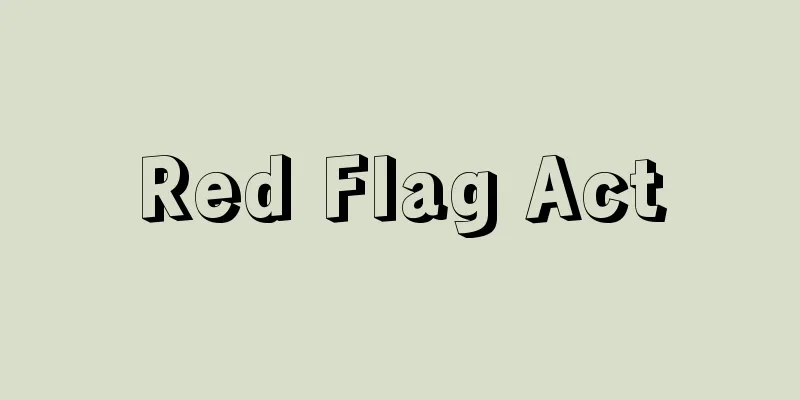Weimar Republic (English spelling)

|
The first German republic was born from the German Revolution in November 1918 and came to an end with the Nazi Party's seizure of power in January 1933. [Toshio Matsu] LaunchThe Social Democratic Party, which had been handed power by the revolution, allied with the military to suppress the revolutionary movement, and made every effort to introduce parliamentary democracy. After the revolutionary uprising in Berlin in January 1919 was suppressed, the Weimar Coalition (Social Democratic Party, Center Party, Democratic Party) won a majority in the election of the National Assembly, elected Ebert as president in February, and in July enacted the Weimar Constitution and launched the Republic. When the Treaty of Versailles was signed in June of the same year, right-wing forces exploited the people's anger and promoted the defeat in World War I as the result of a "stab in the back," which led to some military personnel and right-wing politicians causing the Kapp Putsch in March 1920. The putsch failed due to a general strike by workers, but its influence caused the Weimar Coalition to suffer a major setback in the general election in June of the same year, and both the left and right factions gained power instead. It was also in this year that the Nazi Party formulated its 25-point platform. Meanwhile, in May 1921, the Allies issued an ultimatum demanding Germany pay reparations totaling 132 billion gold marks. Germany was forced to accept this and began making payments, but soon reached an impasse, and in April 1922, they concluded the Treaty of Rapallo with the Soviet Union and Russia, in an attempt to break out of international isolation and develop new markets. This shocked the Allies, and France, citing delays in reparation payments, occupied the Ruhr region together with Belgium in January 1923. Meanwhile, Germany responded with "passive resistance" through a general strike, which paralyzed the German economy, leading to catastrophic inflation and serious social unrest. In August of the same year, Stresemann became chancellor and immediately ended resistance, issued Rentenmarks, and tried to bring inflation under control. He overcame the crisis by foiling the movements of left-wing forces and the Munich Putsch led by the Nazi Party. [Toshio Matsu] StabilityStresemann soon resigned, but continued to serve as foreign minister and promoted the "implementation policy." As a result, the Dawes Plan was enacted in August 1924, which established the standard for reparation payments, the Locarno Treaty was enacted in October 1925, and Germany joined the League of Nations the following year, becoming a permanent member of the Security Council. Meanwhile, the Berlin Treaty was also enacted between Germany and the Soviet Union in April 1926, significantly improving Germany's international status. After the Dawes Plan was enacted, the German economy was rebuilt with the introduction of American capital and rationalization, and soon reached prewar levels. As a result, the Weimar Union regained seats in the general election in December 1924, and culture began to show a boom befitting the "Golden Twenties." However, the influence of big capital, which had consolidated its position through inflation and rationalization, was strong, and in the presidential election held after Ebert's death in 1925, Hindenburg, a "hero" of the war, who was supported by conservatives, was elected, and the government gradually became more conservative. Subsequently, in the general elections of May 1928, the Social Democrats and the Communist Parties gained ground, but the Weimar Coalition still did not have a majority, so Social Democrat Hermann Müller was forced to form an unstable cabinet that also included the People's Party. [Toshio Matsu] DismantlingWhen the Young Plan was presented in June 1929 to replace the Dawes Plan, the right wing launched a fierce opposition movement, and Hitler's activities in particular attracted the attention of the nation. Meanwhile, when the depression occurred in the United States in October of the same year, the German economy, which had been dependent on American capital, was greatly affected, and the Muller Cabinet, which was in financial difficulty, resigned in March 1930. After that, the cabinets of Brüning, Papen, and Schleicher were formed, but all of them were "presidential cabinets" without a parliamentary basis, and tried to overcome the situation by relying solely on emergency decrees from the president. However, the depression became increasingly serious, and by 1932 the number of unemployed people exceeded six million. In the general election of September 1930, the Nazi Party had already made great strides with the support of the middle class, which was suffering from the depression, but on the other hand, the Communist Party also made significant inroads, and big capital and large landowners, wary of this, gradually leaned toward supporting the Nazi Party. As a result, in the presidential election of April 1932, Hitler received nearly as many votes as Hindenburg, and the Nazi Party also won a landslide victory in the general election in July of the same year. The Social Democratic Party and the Communist Party were unable to form a united front due to mutual distrust, and were also unable to seize the opportunity when the Nazi Party temporarily retreated in the general election of November of the same year. Under these circumstances, President Hindenburg appointed Hitler as Chancellor in January 1933, thus bringing the short history of the Republic to a close. [Toshio Matsu] "The History of the Weimar Republic" by Rosenberg, translated by Yoshida Teruo (1970, Toho Publishing) " ▽ "Modern German History" by Murase Okio (1954, University of Tokyo Press)" ▽ "The Weimar Republic" by Hayashi Kentaro (Chuko Shinsho)" ▽ "Intellectuals and Politics" by Waki Keihei (Iwanami Shinsho)" ▽ "The Establishment of the Nazism Regime" by Kurihara Masaru (1981, Minerva Shobo) Source: Shogakukan Encyclopedia Nipponica About Encyclopedia Nipponica Information | Legend |
|
1918年11月のドイツ革命によって生まれ、33年1月のナチス党の政権掌握によって終わりを告げたドイツ最初の共和国。 [松 俊夫] 発足革命によって政権を委譲された社会民主党は、革命派の動きを抑えるために軍部と結び、議会制民主主義の導入に全力をあげた。1919年1月ベルリンで革命派の蜂起(ほうき)が鎮圧されたあと、国民議会の選挙で多数を占めたワイマール連合(社会民主党、中央党、民主党)は、2月にエーベルトを大統領に選び、7月ワイマール憲法を制定して共和国を発足させた。同年6月ベルサイユ条約が調印されると、右派勢力は国民の憤激を利用し、第一次世界大戦の敗北は「背後から、あいくちによって刺された」結果であると宣伝、20年3月には一部の軍人、右翼政治家がカップ一揆(いっき)を引き起こす事態を招いた。一揆は労働者のゼネストによって失敗したが、その影響を受けて同年6月の総選挙では、ワイマール連合が大きく後退し、かわって左右両派が進出した。ナチス党が25か条の綱領を定めたのもこの年である。一方、連合国は21年5月、最後通牒(つうちょう)をもって総額1320億金マルクに上る賠償をドイツに要求した。ドイツはやむなくこれを受諾し、支払いを開始したが、まもなく行き詰まったため、22年4月ソビエト・ロシアとラパロ条約を結び、国際的孤立からの脱却と市場の開拓を図ろうとした。しかしこれは連合国に衝撃を与え、フランスは賠償支払いの遅れを理由に、23年1月ベルギーとともにルール地方を占領、一方、ドイツもゼネストによる「受身の抵抗」で応じたため、ドイツ経済は麻痺(まひ)し、破局的なインフレを招いて深刻な社会不安を引き起こした。そこで同年8月、首相に就任したシュトレーゼマンはただちに抵抗を打ち切り、レンテンマルクを発行してインフレの収拾に努め、左翼勢力の動きやナチス党のミュンヘン一揆を失敗させて危機を克服した。 [松 俊夫] 安定シュトレーゼマンはまもなく辞任したが、引き続き外相にとどまり、「履行政策」を推進した。その結果、1924年8月ドーズ案が成立して賠償支払いの基準が定まり、25年10月にはロカルノ条約が成立し、翌年ドイツは国際連盟に加入して常任理事国となったが、一方、26年4月には独ソ間にベルリン条約も成立し、ドイツの国際的地位は著しく向上した。またドーズ案の成立後、アメリカ資本の導入と合理化によってドイツ経済は再建され、まもなく戦前の水準に達した。それに伴い24年12月の総選挙では、ワイマール連合が議席を回復し、文化も「黄金の20年代」にふさわしい活況をみせ始めた。しかしインフレと合理化によって地位を固めた大資本の影響力は強く、25年エーベルトの死後に行われた大統領選挙では、保守派の推す大戦中の「英雄」ヒンデンブルクが当選、政府もしだいに保守色を強めた。その後、28年5月の総選挙では社会民主党と共産党が進出したが、ワイマール連合はなお過半数を制することができなかったため、社会民主党のヘルマン・ミュラーは人民党をも含む不安定な内閣を組織しなければならなかった。 [松 俊夫] 解体1929年6月、ドーズ案にかわってヤング案が提出されると、右翼は一斉に激しい反対運動を展開し、なかでもヒトラーの活動は一躍国民の注目をひいた。この間、同年10月、アメリカで恐慌が起こると、アメリカ資本に依存してきたドイツ経済は大きな影響を受け、財政難に陥ったミュラー内閣は30年3月辞職した。そのあとブリューニング、パーペン、シュライヒャーの各内閣が成立したが、いずれも議会に基礎をもたない「大統領内閣」で、もっぱら大統領の緊急令に依存して局面の打開を図ろうとした。しかし恐慌の様相はますます深刻化し、32年には失業者数が600万を超える状況に達した。すでに30年9月の総選挙で、ナチス党は恐慌に悩む中間層の支持を受けて大幅に躍進していたが、一方、共産党も著しく進出したため、これを警戒した大資本や大地主はしだいにナチス党の支持に傾いた。その結果、32年4月の大統領選挙では、ヒトラーはヒンデンブルクに迫る票数を獲得、さらに同年7月の総選挙でもナチス党が圧勝した。これに対して社会民主党と共産党は相互の不信感から統一戦線を組みえず、また同年11月の総選挙でナチス党が一時後退した機会をとらえることもできなかった。このような情勢のなかで、33年1月、大統領ヒンデンブルクはヒトラーを首相に任命し、ここに共和国はその短い歴史を閉じたのである。 [松 俊夫] 『ローゼンベルク著、吉田輝夫訳『ヴァイマル共和国史』(1970・東邦出版社)』▽『村瀬興雄著『ドイツ現代史』(1954・東京大学出版会)』▽『林健太郎著『ワイマル共和国』(中公新書)』▽『脇圭平著『知識人と政治』(岩波新書)』▽『栗原優著『ナチズム体制の成立』(1981・ミネルヴァ書房)』 出典 小学館 日本大百科全書(ニッポニカ)日本大百科全書(ニッポニカ)について 情報 | 凡例 |
<<: Weimar Constitution - Weimar Constitution
Recommend
Guo Jingchun
…A scholar from the Six Dynasties period in China...
Great sparrow's gun - Great sparrow's gun
A perennial plant of the grass family (APG classi...
The charter for scientific workers
This is a declaration by scientists themselves of ...
Aichi Liberal Party
...One of the incidents that intensified the Free...
Derbesia
A genus of multinucleated tubular marine green alg...
Linen spinning - Asaitoboseki
In Japan, linen has long been made by spinning hem...
Aomishima - Aomishima (English spelling) bluespotted stargazer
A marine fish of the family Mishimastomidae (illus...
Heberer, G.
...This theory states that modern humans descende...
Gironde [river] - Gironde
The Garonne is a river in southwestern France, nam...
Ogimachi style
…He was born in Kyoto, and after serving as a cou...
Canti - Kanthi (English spelling)
This is a collection of poems by the great modern...
Sphenoid bone
…the upper half of the occipital scale sometimes ...
Curacao Aloe - Curacao Aloe
...We can see from murals that the San have also ...
Brunichilde
…She was of the Visigothic royal family. She was ...
Pilotis (English: pilotis, French)
Originally a French word meaning a pile supportin...




![Arkansas [State] - Arkansas](/upload/images/67cad13e94d5c.webp)




